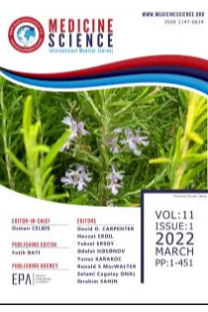Reactivation risk of Hepatitis B Virus in both HBsAg negative and HBcIgG positive patients with solid malignancy. Is antiviral prophylaxis really necessary?
___
Borentain P, Colson P, Coso D, et al. Clinical and virological factors associated with hepatitis B virus reactivation in HBsAg-negative and anti-HBc antibodies-positive patients undergoing chemotherapy and autologous stem cell transplantation for cancer. J Viral Hepat. 2010;17:807-15.Aygen B, Demir AM, Gumuş M, et al. Immunosuppressive therapy and the risk of hepatitis B reactivation: Consensus report. Turk J Gastroenterol 2018;29:259-69.
Pattullo V. Prevention of Hepatitis B reactivation in the setting of immunosuppression. Clin Mol Hepatol. 2016;22:219-37.
Cholongitas E, Haidich A, Apostolidou-kiouti F, et al. Hepatitis B virus reactivation in HBsAg-negative , anti-HBc-positive patients receiving immunosuppressive therapy: a systematic review. 2018;480-90.
Voican CS, Mir O, Loulergue P, et al. Hepatitis B virus reactivation in patients with solid tumors receiving systemic anticancer treatment. Ann Oncol. 2016;27:2172-84.
Reddy KR, Beavers KL, Hammond SP, et al. American Gastroenterological Association Institute guideline on the prevention and treatment of hepatitis B virus reactivation during immunosuppressive drug therapy. Gastroenterology. 2015;148:215-9.
Paul S, Saxena A, Terrin N, et al. Hepatitis b virus reactivation and prophylaxis during solid tumor chemotherapy: A systematic review and meta-analysis. Ann Intern Med. 2016;164:30-40.
Xu Z, Dai W, Wu YT, et al. Prophylactic effect of lamivudine on chemotherapy-induced hepatitis B virus reactivation in patients with solid tumour: A meta-analysis. Eur J Cancer Care (Engl). 2018;27:e12799.
Wu T, Kwok RM, Tran TT. Isolated anti-HBc: The Relevance of Hepatitis B Core Antibody—A Review of New Issues. Am J Gastroenterol. 2017;112:1780-8.
Fukuda W, Hanyu T, Katayama M, et al. Incidence of hepatitis B virus reactivation in patients with resolved infection on immunosuppressive therapy for rheumatic disease: A multicentre, prospective, observational study in Japan. Ann Rheum Dis. 2017;76:1051-6.
Feld JJ. Hepatitis B Reactivation: The Controversies Continue. Dig Dis. 2017;35:351–8.
- ISSN: 2147-0634
- Yayın Aralığı: 4
- Başlangıç: 2012
- Yayıncı: Effect Publishing Agency ( EPA )
Efficacy and safety of intravitreal aflibercept therapy in diabetic macular edema
Ali Cihat ASLAN, Serkan ERDENOZ, Akin CAKİR, Burak ERDEN, Çetin Akpolat, Mustafa ELCİOĞLU
The effects of thyroid hormones levels on prognosis after pediatric heart surgery
Engin GURCU, Ahmet YÜKSEL, Yusuf VELİOĞLU, Isik Senkaya SİGNAK
The use of prophylactic heparin in cancer
Evaluation of 62 bullous pemphigoid patients
İbrahim Halil YAVUZ, Göknur Özaydın YAVUZ, Serap Güneş BİLGİLİ, Kubra TATAR, Irfan BAYRAM
Cause of rare acute abdomen: Primary omental torsion
Gulseren AKPİNAR, Bedia GULEN, ALİ DUMAN, Afsin IPEKCI, Hilal HOCAGİL
Lichenoid hypersensitivity reaction against to dental amalgam: Case report
Merve Nur GUVENC, Emine TÜRKMEN ŞAMDANCI, Ayşe Nur AKATLI, Eren ERDOGAN, Umit YOLCU
Frequency of lysosomal acid lipase deficiency in patients with primary hyperlipidemia
Bahri EVREN, Yılmaz BİLGİC, Feyza FİRAT ATAY, Ayse Nuransoy CENGİZ, Yasir Furkan CAGİN
Baris ARSLAN, Çağatay KÜÇÜKBİNFÖZ, Mustafa KUTUK, Hasan Murat GUNDUZ
Tuberculosis of fifth metatarsal bone- a rare case report
Apoorva HC, Amit Kumar C. JAIN, Suresh KUMAR
Dermatological findings in common rheumatologic diseases in children
